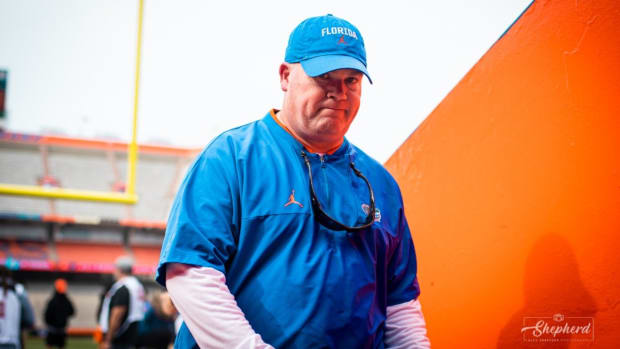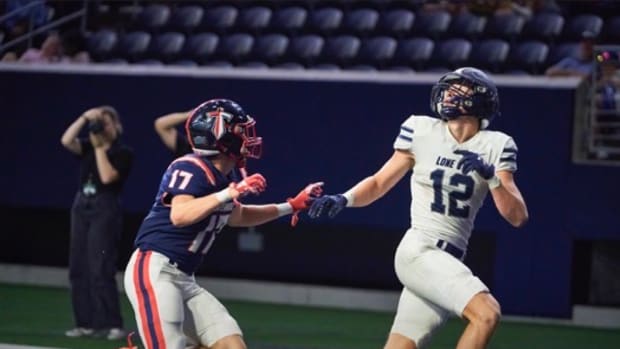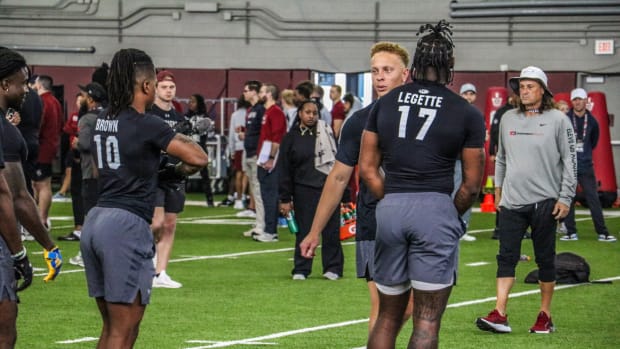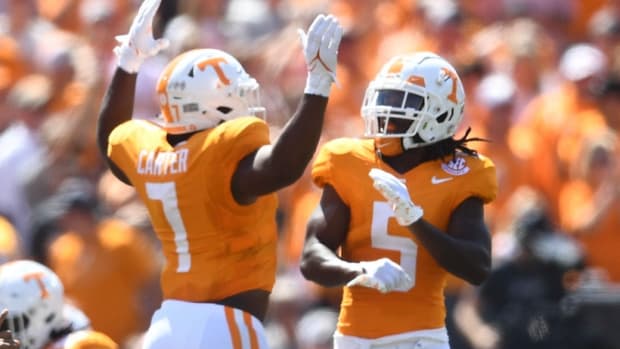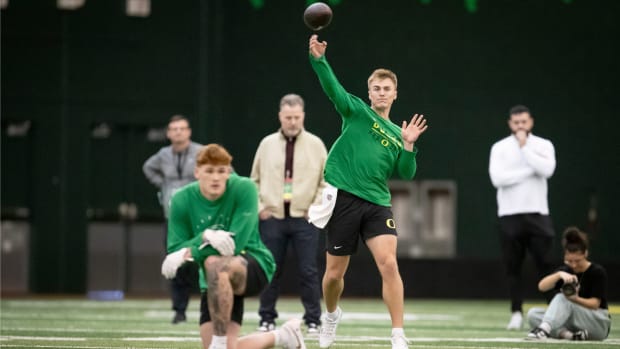Which Second-Year Coach Will Oversee the Biggest Improvement in 2018?
Some of the biggest jumps for programs come in a coach’s second year. Meanwhile, a bad year two can put a coach on the hot seat. So who is headed up or down in 2018?
From Don (via text): What second-year coach has the best chance for a big turnaround this year? Which one has the most difficult future?
The biggest turnaround candidate among the second-year coaches has to be Baylor’s Matt Rhule. The Bears went 1–11 last season with a roster gutted in the wake of an awful scandal that forced a complete house-cleaning that included the firing (or whatever euphemism they used depending on the person) of coach Art Briles, athletic director Ian McCaw and president Kenneth Starr. Rhule’s history at Temple suggests he can rebuild the program, but year one was always going to be a struggle because of massive roster turnover and the virtual wipeout of the 2016 recruiting class by the scandal. By season’s end, the Bears were playing true freshmen in the double digits.
Still, Baylor was competitive against Oklahoma and West Virginia in 2017. Those games offered glimpses of what the Bears might be once Rhule gets his program fully operational. Quarterback Charlie Brewer seized the job as the season wore on, and he’ll lead an offense that, while still young, has plenty of experience. The defense may still give up some explosive plays, but it’s the Big 12. Much will depend on how healthy the Bears can stay, but Baylor should have the biggest improvement in the win column in college football this season.
The other candidate for a big improvement—though not nearly as big in number of wins—is only a 90-minute drive away. Tom Herman now knows what he’s dealing with at Texas, but we’ll save the specifics for the answer to the next question.
The second-year coach with most difficult future is LSU’s Ed Orgeron, because his team might have the nation’s most difficult schedule. It’s easy to forget that Orgeron is only in his second season in charge at LSU because he served as the interim coach for most of the 2016 season, but it has only been 18 months since he was named the full-time head coach.
Despite what you might read, it would take a meltdown of epic proportions for Orgeron to lose his job this year. A more likely scenario would be the firing of athletic director Joe Alleva if the Tigers fall below the fan base’s typically massive expectations. Orgeron will get some time, and he should. LSU’s talent level had dipped significantly in the last year or two of the Les Miles era, and it will take a few recruiting classes to get the roster back to what we’ve come to expect from LSU. The Tigers’ success against a schedule that includes the SEC West, Florida, Georgia and Miami will depend largely on quarterback play in a new offense.
Orgeron’s sales pitch when he got the job was that he’d hire good coordinators and stay out of their way. That happened with defensive coordinator Dave Aranda, but when Lane Kiffin decided to take the Florida Atlantic head coaching job for half the money he would have made as LSU’s offensive coordinator, Orgeron had to go outside his comfort zone. He hired Matt Canada to run the offense, and personality conflicts quickly ensued. The decree to eliminate the motions and shifts that make Canada’s offense what it is probably cost LSU the Troy game (and a 10-win season). After the season, Orgeron hit the reset button. Canada was paid $1.7 million to go away. (He wound up at Maryland.) LSU tight ends coach—and interim offensive coordinator under Orgeron in 2016—Steve Ensminger took over as OC, and 73-year-old longtime NFL assistant Jerry Sullivan was bumped up from consultant to passing game coordinator.
Orgeron clearly trusts Ensminger and Sullivan, but they’ll have to prove they can create an offense that moves the ball. They’ll probably try to prove that with Ohio State graduate transfer Joe Burrow at quarterback. Sophomore Myles Brennan entered the offseason as a prime candidate to replace Danny Etling, but Brennan didn’t outplay redshirt freshman Lowell Narcisse or junior Justin McMillan in spring practice. With no quarterback separating himself, the Tigers looked outside. Burrow had been edged out by Dwayne Haskins in Columbus, but his Ohio State teammates and coaches believed him capable of starting almost anywhere else. He didn’t come to Baton Rouge to sit, so it will be a surprise if he doesn’t wind up starting.
How Ed Orgeron and LSU Landed 'Game-Changer' QB Transfer Joe Burrow
From Alex: O.K., let’s hear what you have to say about Texas. Looked good in bowl game without all those draftees playing. Can they get eight regular-season wins? If Herman calls plays, we could be in for the classic two-year coach rebound.
I was all set to give my stock answer about Texas—I’ll believe it when I see it—until I read Alex’s third sentence. Eight regular-season wins for the Longhorns is a reasonable ask for Tom Herman’s second year. Given its resources and location, Texas should obviously win more than that on a consistent basis, but remember that the Longhorns haven’t won more than six regular-season games since Mack Brown’s final season in 2013. Baby steps feel about right at this point.
The Longhorns should be able to improve by two wins in part because they’ll field a deeper offensive line. By the end of the 2017 regular season, they were so thin up front that the offense was barely functional. A defense that carried Texas for much of last season must replace some key pieces (DT Poona Ford, LB Malik Jefferson, S DeShon Elliott), but coordinator Todd Orlando seems capable of plugging in younger players without much dropoff.
Alex also brings up the notion of Herman calling plays, which is a fascinating offseason drama that is getting huge attention locally and not much nationally. Herman called plays in the Texas Bowl win against Missouri, and that has brought constant questions about whether Herman will call plays instead of offensive coordinator Tim Beck going forward. I asked Herman about this in April, and he explained that he felt the only way he could properly evaluate the offense was by calling plays in the bowl game. He also downplayed his contribution. “We had three weeks to prepare, and we had 280 yards of offense,” he said. “So let’s not think that Tom Herman calling plays is the end-all, be-all here.”
Herman isn’t exactly wrong with regard to that game. The Longhorns averaged an abysmal 3.9 yards a play. They did adjust tempo to control the clock against an opponent that had cracked 45 points in each of the previous five games, and they scored seemingly every time Missouri got close, but the offense wasn’t what anyone would consider dynamic.
Still, Herman is the best playcaller on the Texas staff. That isn’t up for debate. Other head coaches have had success while calling plays. Texas A&M coach Jimbo Fisher won a national title calling plays at Florida State. Lincoln Riley won the Big 12 calling plays in his first season as Oklahoma’s head coach. It’s certainly in the realm of possibility that Herman could make Texas better by calling plays. But he has to decide he wants to do it. “We’re going to evaluate everything,” Herman said in April. “If I feel like I can help in that area, then I will.”
From Watson: I know Kyler Murray is winning all the Norman people over by saying he's gonna play football this year, but how likely is it—when it's time to put the money where the mouth is—that Kyler Murray is legitimately out there risking his body playing football? I just don't believe him.
I believe him, because why say after getting drafted that you’re going to play football this year if you aren’t going to play football this year? After Murray went No. 9 to the A’s and found himself in line to make about $5 million as a signing bonus, no one would have been surprised had Murray decided to focus only on baseball. No one would have blamed him, either. If Murray, a five-tool outfielder, lives up to his draft position, his second baseball contract would be a fully guaranteed deal with an eight-figure annual salary. As a 5'10", 190-pound quarterback, it would be nearly impossible to make that kind of money playing football. Plus, Murray stands a lot better chance of staying healthy playing baseball.
That’s a long way of saying we all would have understood had Murray shifted gears and decided to play only baseball. So the fact that he still insists he’s playing football this season suggests he’s quite intent on playing football this season.
From Cole: Would Ohio State have made the playoffs if they had scheduled a cupcake opponent instead of scheduling Oklahoma? If the answer is yes, then isn’t this a scary sign for those of us who enjoy quality non-conference games early in the season?
As long as a 55–24 loss to a 7–5 Iowa team was on the resume, Ohio State wasn’t making the playoff. The Oklahoma loss wasn’t the issue. But what should make you optimistic for future non-conference games is that Ohio State probably did make the playoff following the 2016 season because it scheduled Oklahoma. Pounding the eventual Big 12 champ on the road helped the Buckeyes get a No. 3 seed despite the fact that they didn’t win their own division.
One big misconception about the selection committee’s deliberation in 2016 was that Ohio State was selected instead of Big Ten champ Penn State. In reality, Ohio State was chosen over Pac-12 champ Washington and over Penn State. That Oklahoma win made a huge difference for the Buckeyes.

